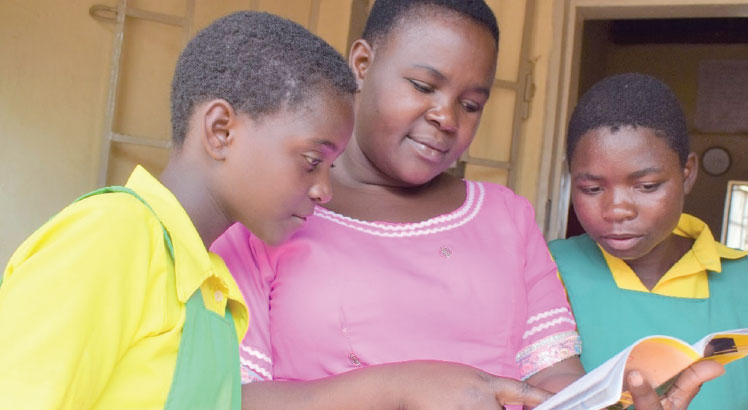Why Alefa keeps learning amid Covid
The discovery of the Covid-19 pandemic in December 2019 left Alefa Banda confident that it was too remote a threat for her.
Like many of her peers, the 13-year-old Standard Seven learner at St John Primary School in Mwanza, continued to live normally as Covid-19 spread worldwide at the speed people travel and interact.
However, the reality hit home on March 23 2020 when the Government of Malawi closed all schools to limit the outbreak fuelled by overcrowding and frequently touched surfaces.
“When I heard the announcement on the radio, I couldn’t tell when we would return to school and continue to learn normally. I thought we would be back in a day or a week, but ended up losing several months of learning,’ she recalls.

Laboratory scientists in Lilongwe, the capital city of Malawi, confirmed the country’s first three Covid-19 cases on April 2, ten days into the emergency school closure.
Alefa says she feared for her future. Like nearly five million children in Malawi, the girl would spend six months out of school amid uncertainties.
“I was afraid of dying if I caught the virus,” she explains. “I was hearing about people dying from breathing difficulties. Schools were close, and I couldn’t go out to play with my peers. My parents ordered me to stay home and study, warning that the disease spreads fast in crowded settings.”
Alefa happily returned to school in September 2020, but the thrill was short-lived. In January 2021, the Covid-19 second wave, the country’s deadliest, forced the government to order another school shutdown spanning five weeks.
A year on, Alefa feels lucky to be back in school and reunite with her friends such as Chimwemwe Singano, who aspires to be a banker. On 16 September 2022, the two passed their Standard Seven examinations in readiness to go into Standard Eight.
“When schools closed, because I couldn’t wait to return to class,” she declares. “I was bitter because, without Covid-19, I would have been going to secondary school now.”
What inspired her to return to school after the school closure necessitated by Covid-19?
Alefa flinches, explaining: “My mother told me Covid-19 isn’t the end of life, so I was motivated to get back to school and pursue my dream of becoming a nurse.
“Mom loves me; she wants me to succeed. If I learn without disruption, I’ll become what I want, get a decent job, earn a better income than those who drop out, and uplift myself, my family, and the nation.”
But Alefa is worried that some children, especially girls, did not return after the Covid-related school closure.
“Many learners, mostly in Standard Eight, married and became mothers young. As children, we weren’t safe at home. Some parents weren’t encouraging their children to study and avoid risky sexual activities,” she states.
In Malawi, widespread teen pregnancies and child marriages disrupt efforts to ensure every child learns.
The 2015 Malawi Demographics and Health Survey shows that nearly half of all girls marry before their 18th birthday and a third get pregnant before reaching 19.
During the protracted school closure, rapid assessments by the Government with support from Unicef revealed a 11 percent rise in teen pregnancies compared to the 2019 count.
The findings announced by the Ministry of Gender, Community Development and Social Welfare show that over 13 000 teenagers fell pregnant and 40 000 others married between March and July 2020.
Alefa thanks her teachers for tirelessly giving learners pep talks on the importance of staying in school amid the Covid-19 pandemic.
She states: “When we returned to school, we had to mask up, frequently wash hands with soap, sit far apart and desks that sat three learners now took just two.
“Regularly, our teachers give us talks, encouraging us to keep learning because Covid-19 is not the end of life. They encourage us to open up, share our fears and support us so we don’t drop out.”
Eneless Kadammanja, the deputy headteacher at St John’s Primary School, thanks the government and partners for training teachers to support learners with remedial learning amid the Covid-19 pandemic. The training was done through Unicef Malawi with funding from the United Nations Multi-Partner Trust Fund.
She explains: “The public and one-on-one sessions have helped us understand learners’ fears and confront myths that may compel them to quit school. We help them remain in school. We don’t want to lose them like thousands who married and got pregnant during the school closure. Then many children, especially girls, quit school because the future looked uncertain for some, and others were discouraged by their peers that schools would not reopen.”
Six girls at Alefa’s school got married and four were pregnant, the highest count Kadammanja has seen in her teaching career spanning 14 years. She has spent five of those at her current school.
She says: “I am grateful for training to motivate, counsel, and support the children not to drop out.
Although Covid-19 remains in our midst, we must ensure that every child stays in school. This is crucial to ending poverty.”





